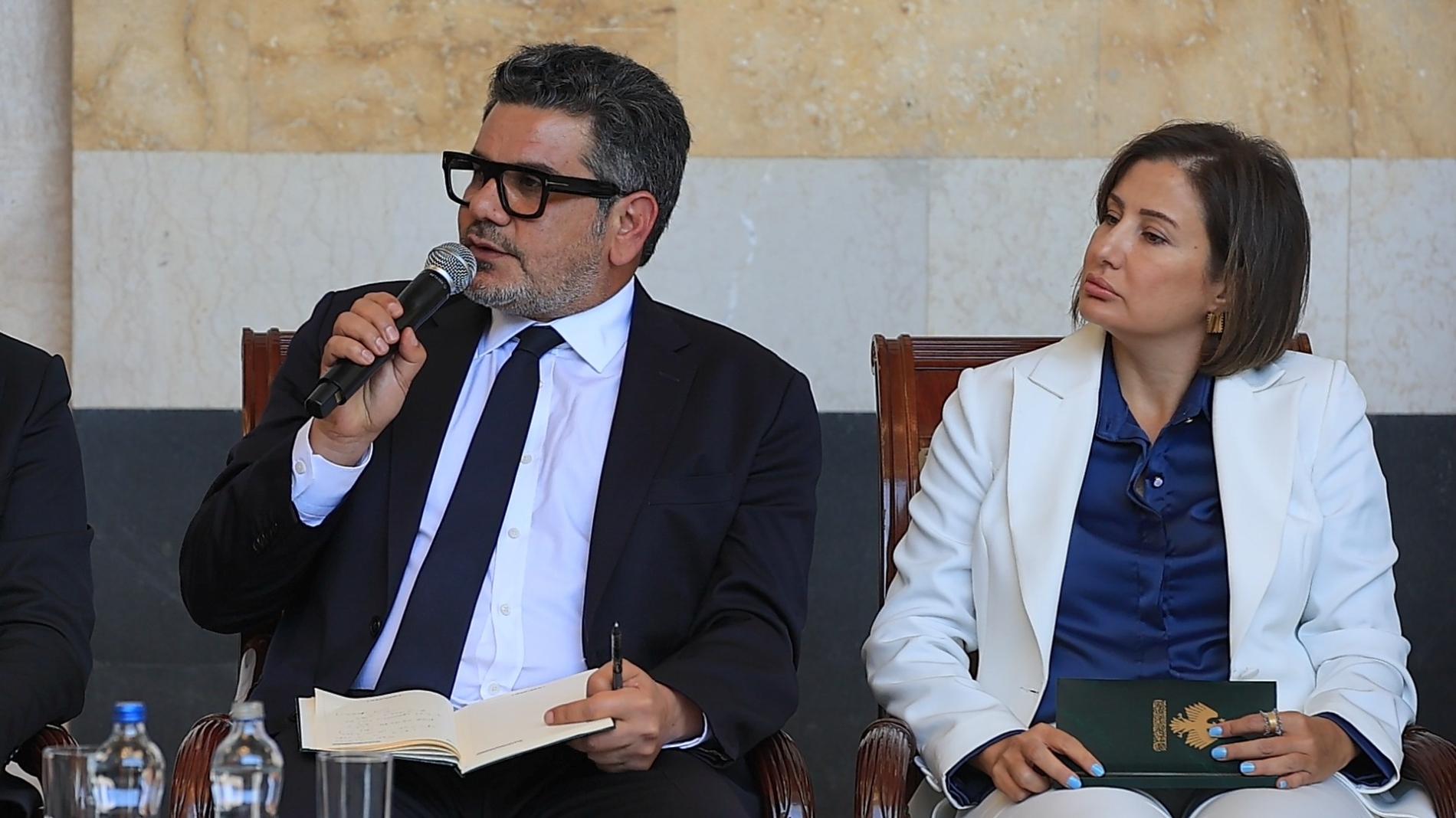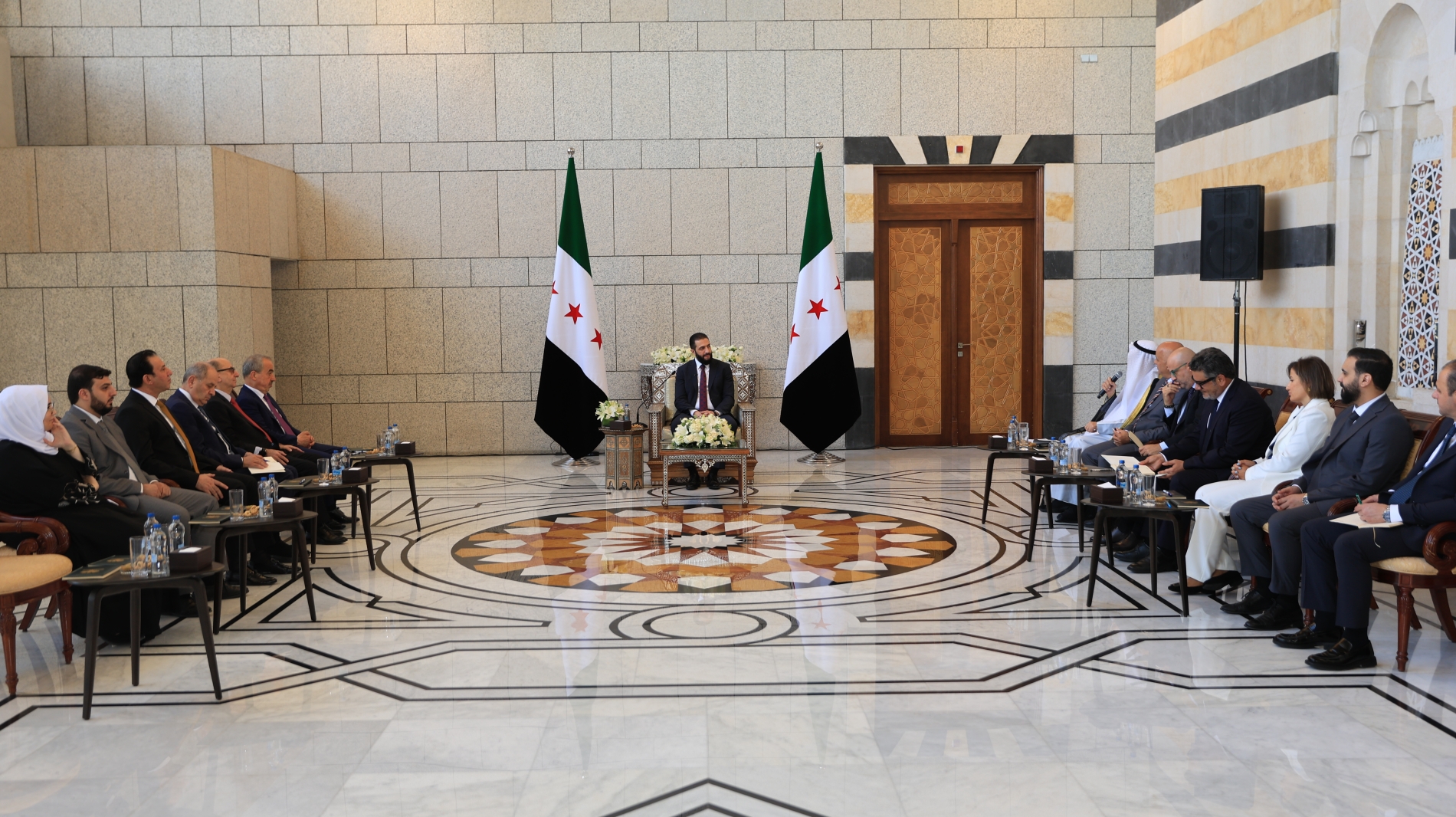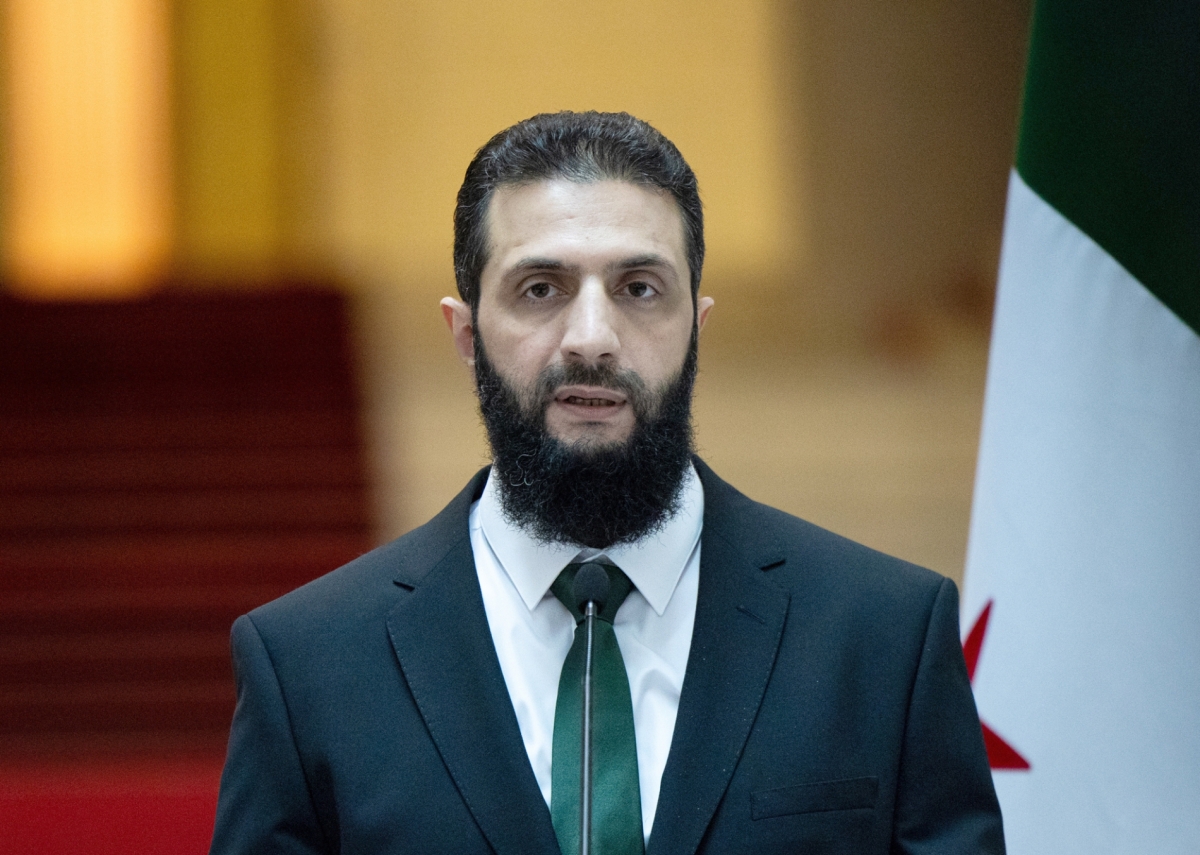In response to a question from Al Majalla, Syrian President Ahmad al-Sharaa affirmed that his strategy centres on “zero-problems and resolving disputes,” emphasising that Syria cannot replicate the “Abraham Accords” given the vastly different circumstances. “The Golan is occupied land,” he said, stressing that the priority is “a return to the 1974 disengagement agreement or a similar arrangement—establishing security in southern Syria under international supervision.”
Al-Sharaa made these remarks during a meeting at the presidential palace in Damascus on Sunday afternoon, attended by an Arab delegation of editors-in-chief and former ministers. He addressed a wide range of questions on Syria’s domestic situation and its relations with neighbouring states and the wider international community.
The discussion covered political, economic, and security issues, future investment, negotiations with the Syrian Democratic Forces (SDF), unrest in Sweida, the distinction between decentralisation and federalism, and prospects for engagement with Israel.
Asked by Al Majalla about his upcoming trip to New York—the first by a Syrian president to the United Nations General Assembly since June 1967—al-Sharaa said Syria had long been in “a state of isolation within isolation,” brought about by the former regime’s conduct and the international community’s stance. “My participation is a major indicator of a shift in international positions towards Syria, whether due to our policies or changes in others’ approaches toward Syria,” he observed.
He described the visit as “one of the key turning points in Syria,” adding, “US sanctions have been in place since 1979; however, now we maintain positive relations with the US, Saudi Arabia, Türkiye, the UAE, Qatar, Jordan, and several European countries.”

No Abraham Accords
On whether Syria might join the Abraham Accords, particularly following a White House invitation to Damascus, al-Sharaa highlighted the key differences between Syria and the Arab states that have signed the agreements. “These accords were concluded between Israel and countries with which it has no direct disputes and that do not share borders with it. Syria’s reality is entirely different. For us, the Golan Heights remain occupied territory,” he said, firmly ruling out any comparable agreement.
The president reiterated: “Our goal is zero-problems and dispute resolution. This is our strategy.” He emphasised that Syria—with its internal strengths and international alliances—would not be dragged into war, instead opting to explain its stance clearly and “secure support for a unified, strong Syria.”
On the 1974 disengagement agreement, al-Sharaa said, “The former regime honoured the 1974 disengagement agreement, and international forces were deployed to oversee its implementation.”
Significantly, Israel, which may have been counting on shifting the Lebanon conflict into Syrian territory, was caught off guard by the fall of the Assad regime on 8 December—a development that defied its intelligence assessments. “In one day, Israel found itself facing a new reality that upended its strategic calculations,” he said.
Since then, Israel has launched hundreds of air strikes on Syria’s strategic assets and taken positions on Mount Hermon and within the demilitarised zone stipulated by the 1974 agreement. Some believe Tel Aviv is banking on Syria’s fragmentation.
Al-Sharaa insisted that “any policy aimed at partitioning Syria will fail.” He emphasised that “the occupation of the Golan, ongoing since 1967, enjoys no Arab, regional, or international legitimacy. States oppose partition because they fear its domino effect and prefer to preserve national unity.”
He added, “In short, when Israel alludes to the prospect of division, it is merely a pressure tactic—one that is unrealistic and destined to clash with the stark realities on the ground. A broad segment of the Syrian public firmly rejects any notion of partition.”
Answering another question, he repeated, “The priority now is a return to the 1974 disengagement agreement or a similar arrangement—establishing security in southern Syria under international supervision.” He stressed that any security arrangement would depend on its substance: “If we achieve something, we will not conceal it. We’ll announce every step that serves the nation and fosters stability.”

A clean slate with Lebanon
On Lebanon, al-Sharaa emphasised the deep geographical and historical ties between Damascus and Beirut. “Lebanon suffered significantly under the former Syrian regime. There is what we call ‘geographical coercion’, where geography itself has worked against Lebanon,” he said. He added, “Syria and Lebanon need to open a clean slate in their relationship— one on which a fresh chapter in their shared history can be written. The burden of past grievances must be lifted, and there is a clear determination to achieve that.”
He acknowledged Lebanon’s urgent need for political stability and economic revival, noting that it could benefit from Syria’s rebound. “We have much in common, such as ports, roads, and avenues for cooperation. It is important to understand that Syria has no intention of dominating Lebanon. Relations must be approached through the proper channels, and that is precisely what I have done. I have spoken with the Lebanese President and Prime Minister Nawaf Salam.”
Al-Sharaa said that upon returning to Damascus after the fall of al-Assad, he refrained from commenting on Lebanon’s internal affairs, seeking to remain “equidistant from all parties.” He described the Middle East as “boiling, from Gaza to the West Bank and beyond,” adding that “regional powers are vying for influence and seeking to exploit the unrest.” “Iran has sustained significant losses and its axis has weakened, prompting attempts at a resurgence,” he said.
He emphasised that the region "needs to eliminate problems." When the crisis in Syria began, its impact was felt across the entire region. "That is why we are working to promote regional stability, focusing on improving Syria’s internal conditions and economy, to set a model for others and contribute to broader stability," he said.
He added, "I conveyed a message to Lebanon, Iraq, and other countries in the region through the formation of the Syrian government. I firmly reject sectarian quotas and affirmed that our objective is inclusive governance, built on genuine partnership in the administration of the country and the reinforcement of citizenship. This is the cornerstone of our approach."











